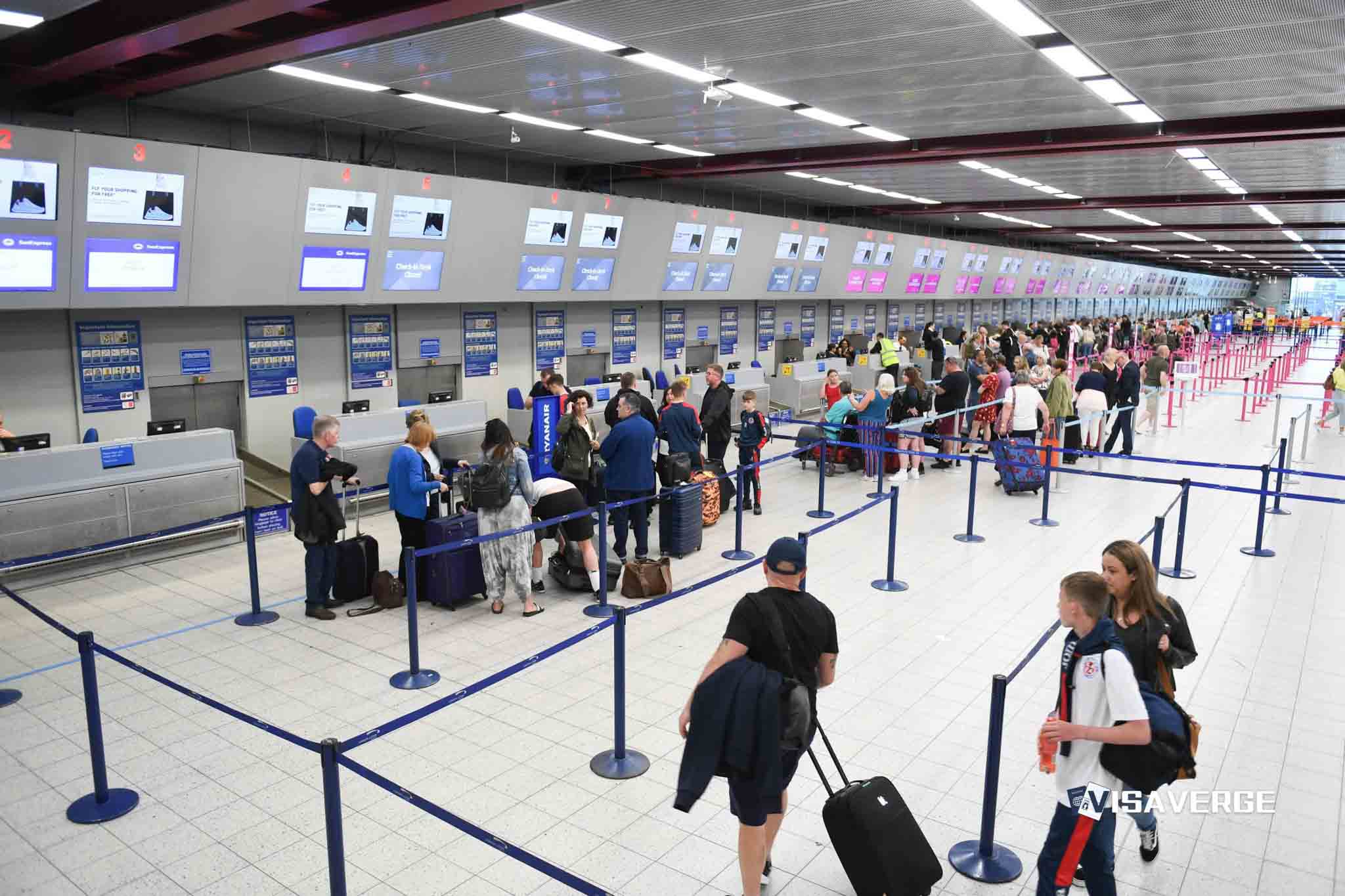Key Takeaways
• Two Osceola County immigrants returned to Florida after what advocates called an unjust ICE deportation on June 12, 2025.
• Florida’s aggressive immigration policies include expanded 287(g) program and largest ICE operation arresting 1,120 people in April 2025.
• Legal experts warn of due process violations; families face fear, separation, and lack of transparency in deportation cases.
Two Osceola County Immigrants Return to Florida After ‘Unjust’ ICE Deportation: What It Means for Immigrant Communities
Two immigrants from Osceola County have returned to Florida after what advocates and some officials are calling an “unjust” deportation by U.S. Immigration and Customs Enforcement (ICE). Their return, reported on June 12, 2025, by FOX 35 Orlando, is a rare event in Florida’s current immigration enforcement climate. This case has drawn attention to the state’s aggressive immigration policies, the impact on families, and the ongoing debate about due process and transparency in deportation cases.

This article explains what happened, why it matters, and what it means for immigrants, families, and communities in Florida. It also provides practical steps for those facing similar situations, and shares perspectives from officials, legal experts, and community members.
What Happened: The Return of Two Osceola County Immigrants
On June 12, 2025, two immigrants who had been living in Osceola County, Florida, returned to the state after being deported by ICE. Advocates, attorneys, and some local officials described their deportation as “unjust,” raising concerns about due process and the fairness of the removal process. The details of their cases have not been fully released, and ICE has not issued an official statement about why these individuals were allowed to return.
Their return is especially notable because it comes during a period of increased ICE activity in Central Florida. Over the past month, there have been large-scale raids, more detentions, and a general sense of fear among immigrant communities. The reversal of these deportations is rare and has sparked hope for other families facing similar situations.
Why This Case Stands Out
Florida has become one of the most aggressive states in the country for immigration enforcement. In recent months, the state government has passed new laws that increase penalties for undocumented immigrants and encourage local law enforcement to work closely with ICE. The 287(g) program, which allows local police to act with ICE authority, has expanded in many counties, including Osceola County.
The return of these two individuals is unusual because:
- ICE rarely reverses deportations. Once someone is removed from the United States 🇺🇸, it is very difficult to come back, even if the deportation was a mistake.
- Advocates and attorneys had to fight hard for their return. Legal teams and community groups worked together to challenge the deportations, arguing that the individuals’ rights were violated.
- The case highlights concerns about due process. Many families and lawyers say that people are being deported without proper legal review or notice, especially during large raids.
Recent Policy Changes in Florida
Florida’s approach to immigration has changed quickly over the past year. The state government, under Governor Ron DeSantis, has made it clear that it wants to be a leader in supporting federal immigration enforcement. Some of the most important changes include:
- Expanded state-level penalties for undocumented immigrants. New laws make it a crime to knowingly enter or try to enter Florida illegally. Penalties for undocumented immigrants convicted of crimes have also increased.
- Increased cooperation with ICE. The 287(g) program has grown, allowing local law enforcement to detain people on behalf of ICE.
- Large-scale ICE operations. In late April 2025, ICE led the largest joint immigration operation in Florida history, arresting 1,120 people in a single week. Of those arrested, 63% had prior criminal arrests or convictions.
- More detentions without state charges. From January 1 to May 10, 2025, 438 people were booked into Orange County Jail on ICE detainers, even though they did not face state charges.
These changes have made Florida a difficult place for undocumented immigrants and their families. Many people now live in fear of sudden raids, detention, and deportation.
The Human Impact: Families and Communities in Osceola County
The aggressive enforcement environment has had a deep effect on families and communities in Osceola County and across Florida. Families have described the emotional pain and practical problems caused by sudden detentions and deportations. Some of the main impacts include:
- Family separation. When a parent or family member is detained or deported, children and spouses are left behind, often without support.
- Uncertainty about legal rights. Many families do not know what to do when a loved one is taken by ICE. They may not be told where the person is being held or what charges they face.
- Disruption of local businesses. Many immigrants have lived and worked in Florida for years. Their sudden removal can hurt local businesses and the wider community.
- Fear and confusion. The constant threat of raids and detentions has created a climate of fear, making it hard for people to go about their daily lives.
One family member described the experience as “living in constant fear, never knowing if today will be the day someone is taken away.” Legal experts say that this fear is made worse by a lack of transparency from ICE and local officials.
How Deportation Challenges Work: Step-by-Step
For families facing deportation, the process can be confusing and overwhelming. Here’s a simple breakdown of the steps involved in challenging a deportation:
- Detention by ICE: ICE detains individuals, often after a referral from local law enforcement or during a targeted raid.
- Legal Notification: Detainees and their families are not always told right away where the person is being held or what charges they face. This makes it hard to respond quickly.
- Finding Legal Help: Families usually need to find an immigration attorney. Lawyers can file motions to reopen cases or challenge deportation orders in federal court.
- Court Proceedings: Legal challenges may involve arguing that the person’s rights were violated, presenting new evidence, or showing that the person qualifies for relief (like a U-Visa for crime victims or asylum for those fleeing danger).
- ICE Review: In some cases, ICE may review the case and, if they find that a mistake was made, help the person return to the United States 🇺🇸.
- Community Advocacy: Advocacy groups often step in to raise public awareness, organize protests, and pressure officials to act.
For official information on ICE procedures and detainee rights, visit the ICE official website.
Perspectives from Stakeholders
ICE and State Officials
ICE Deputy Director Madison Sheahan praised recent large-scale operations as a “collaborative whole-of-government effort” to improve public safety. Governor Ron DeSantis has said that Florida is “the tip of the spear” in supporting federal immigration enforcement, pointing to the success of recent operations as proof of the state’s commitment.
Officials argue that these actions are necessary to remove people with criminal records and to protect communities. They say that most of those arrested in recent raids had prior criminal arrests or convictions.
Legal Experts and Advocacy Groups
Legal experts and advocacy groups have a different view. They warn that the fast pace of enforcement and the use of expedited procedures can lead to mistakes and wrongful deportations. According to analysis by VisaVerge.com, there are growing concerns about due process violations, such as deportations without proper legal review or notice to families.
Advocacy groups also argue that the current policies have led to widespread fear, family separation, and possible violations of constitutional rights. They are calling for more oversight and transparency from ICE and state agencies.
Community Members
People in Osceola County and other parts of Florida say that the current environment is confusing and stressful. Many report having trouble finding out where detained loved ones are being held or how to get legal help. Some families have turned to local advocacy groups and faith-based organizations for support.
Background: How Florida Became a Hotspot for Immigration Enforcement
Florida’s tough approach to immigration enforcement did not happen overnight. Since 2024, the state government has worked closely with federal officials to increase detentions and deportations. The 287(g) program has allowed local police to act with ICE authority, leading to more arrests.
At the same time, ICE has stopped publishing updated arrest and deportation statistics since January 2025. This lack of transparency makes it hard for advocates and families to track cases and understand the full impact of enforcement actions.
The large-scale raids and detentions in 2025 are part of a broader trend of increased immigration enforcement across the United States 🇺🇸, but Florida has become one of the most active states in this area.
Legal and Policy Implications
The return of the two Osceola County immigrants has raised important questions about due process, transparency, and the rights of immigrants. Some of the key issues include:
- Due process violations. Legal experts say that people are sometimes deported without a fair hearing or enough time to present their case.
- Lack of transparency. Families and advocates often do not know where detainees are being held or what is happening in their cases.
- Legal challenges. Attorneys are filing lawsuits to challenge deportation orders and to demand better oversight of ICE operations.
- Community disruption. The removal of long-term residents can hurt local economies and break up families.
These issues are likely to be the focus of ongoing legal and political battles in Florida and across the country.
What to Do If a Loved One Is Detained or Deported
If someone you know is detained or deported by ICE in Florida, here are some practical steps you can take:
- Contact a qualified immigration attorney. The American Immigration Lawyers Association (aila.org) can help you find a lawyer in your area.
- Reach out to local advocacy groups. Organizations like the Florida Immigrant Coalition (floridainmigrant.org) provide support and resources for families.
- Ask for information. Try to get the detainee’s A-number (Alien Registration Number) and use the ICE Detainee Locator System to find out where they are being held.
- Gather documents. Collect any documents that show the person’s ties to the community, work history, and family relationships. These can help in legal challenges.
- Stay informed. Follow updates from trusted news sources and official government websites.
Looking Ahead: What’s Next for Immigration Enforcement in Florida?
The political climate in Florida suggests that aggressive immigration enforcement will continue. However, ongoing legal challenges and public pressure could lead to changes in how deportation cases are handled.
Advocacy groups are pushing for:
- More oversight and transparency from ICE and state agencies.
- Better protection of due process rights for immigrants.
- Support for families affected by detention and deportation.
At the same time, court rulings in cases like the Osceola County deportations could set new standards for how similar cases are handled in the future.
Resources for Immigrants and Families
If you or someone you know is affected by ICE deportation in Florida, here are some resources:
- ICE Official Website: ice.gov
- Florida Immigrant Coalition: floridainmigrant.org
- American Immigration Lawyers Association: aila.org
- Local Advocacy Groups: Many churches, community centers, and nonprofit organizations offer help to families facing detention or deportation.
Conclusion: A Rare Reversal Highlights Bigger Issues
The return of two Osceola County immigrants to Florida after an “unjust” ICE deportation is a rare and important event. It shines a light on the challenges facing immigrant families in Florida, the risks of aggressive enforcement, and the need for fair and transparent legal processes.
As reported by VisaVerge.com, this case is part of a larger debate about the future of immigration enforcement in Florida and the United States 🇺🇸. With ongoing legal battles, policy changes, and community activism, the outcome of these debates will shape the lives of thousands of families in the years to come.
For those affected, knowing your rights, seeking legal help, and connecting with community resources are the best ways to respond to the challenges of ICE deportation in Florida. The story of the two Osceola County immigrants shows that, even in difficult times, it is possible to fight for justice and bring families back together.
Learn Today
ICE → U.S. Immigration and Customs Enforcement, federal agency enforcing immigration laws and deportations.
287(g) program → A program allowing local police to cooperate with ICE in enforcing immigration laws.
Due process → Legal requirement that individuals receive fair treatment and notice before deportation or legal action.
Detainer → A request by ICE to local authorities to hold a person for immigration enforcement.
U-Visa → A visa for victims of certain crimes who assist law enforcement in investigations or prosecutions.
This Article in a Nutshell
Two Osceola County immigrants returned to Florida after an unjust ICE deportation. This rare reversal highlights concerns over due process violations amid aggressive state immigration enforcement policies.
— By VisaVerge.com






